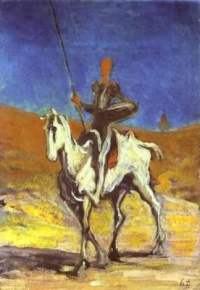Hero
From The Art and Popular Culture Encyclopedia
|
"At the close of the sixteenth century appeared a series of fictions distinct from the jest-books and legends, although somewhat allied to Robin Hood literature in celebrating heroes of the people. Thomas Deloney, "the balleting silke weaver," as Nash called him, deserves the credit of launching this genre, which differs from such a hero tale in low-life as Croce's Vita di Bertoldo in its larger use of realism."--The Literature of Roguery (1907) by Frank Wadleigh Chandler "We cannot suppose "The Battle of the Frogs and Mice," or "The Banquet of Matron," although written in imitation of the heroic poetry of Homer, was intended to make "The Iliad" appear ridiculous."--History of English Humour (1878) by Alfred Guy Kingan L'Estrange "Peter dons the requisite Spandex and goes out to battle evil."--Our Gods Wear Spandex (2007) is a book by Christopher Knowles |

|
Related e |
|
Featured: |
A hero (heroine in its feminine form) is a real person or a main fictional character who, in the face of danger, combats adversity through feats of ingenuity, courage, or strength. The original hero type of classical epics did such things for the sake of glory and honor. Post-classical and modern heroes, on the other hand, perform great deeds or selfless acts for the common good instead of the classical goal of wealth, pride, and fame. The antonym of hero is villain. Other terms associated with the concept of hero may include good guy or white hat.
In classical literature, the hero is the main or revered character in heroic epic poetry celebrated through ancient legends of a people, often striving for military conquest and living by a continually flawed personal honor code. The definition of a hero has changed throughout time. Merriam Webster dictionary defines a hero as "a person who is admired for great or brave acts or fine qualities". Examples of heroes range from mythological figures, such as Gilgamesh, Achilles and Iphigenia, to historical and modern figures, such as Joan of Arc, Giuseppe Garibaldi, Sophie Scholl, The Unknown Rebel, Audie Murphy, and Chuck Yeager, and fictional "superheroes", including Superman, Spider-Man, Batman, and Captain America.
Contrast
See also
- fatal flaw
- Action hero
- Antihero
- Byronic hero
- Culture hero
- Fantasy tropes and conventions
- Folk hero
- Germanic hero
- Heroine
- Heroic nudity
- Reluctant hero
- Romantic hero
- Superhero
- Tragic hero
- The Hero With a Thousand Faces
- Youxia
- List of genres
- Hero of Labour
- List of folk heroes
- List of culture heroes
- Mock heroic
- Coronation of the Hero of Virtue by Peter Paul Rubens, c. 1612-1614 [1]


